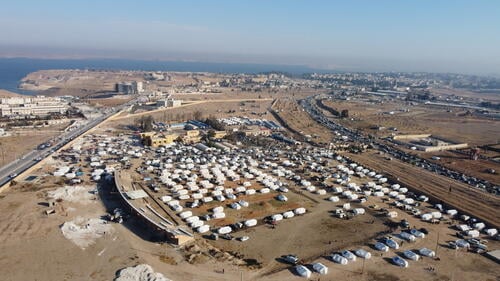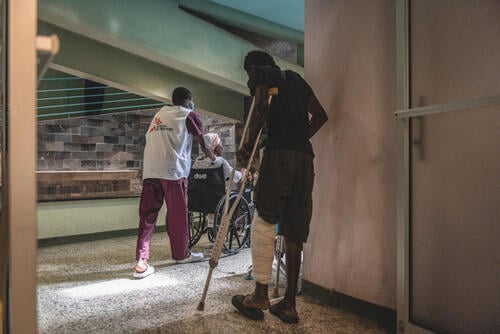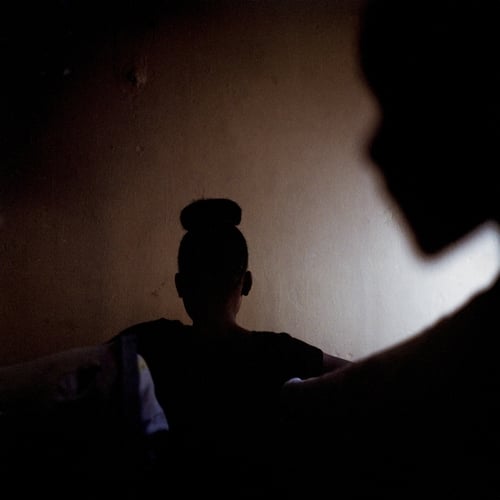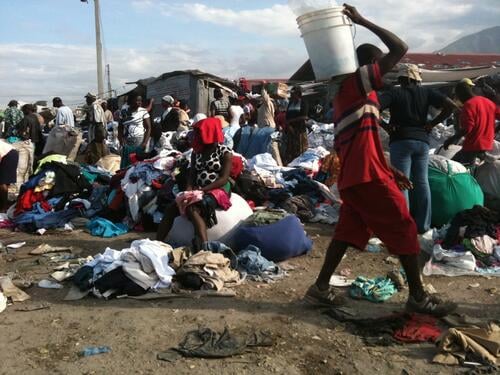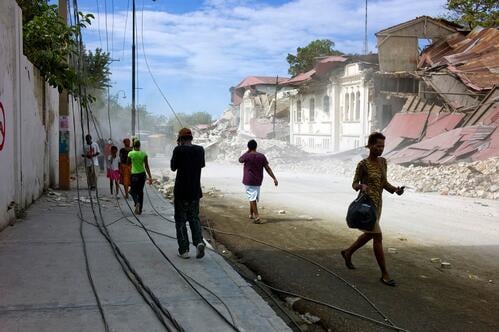In Haiti, we provide care to victims of trauma, survivors of sexual and gender-based violence, as well as sexual and reproductive care. With natural disasters regularly occurring in the country, emergency response also remains a central aspect of our work in the country.
Since the assassination of the Haitian President in 2021, the people of the capital Port-au-Prince have been struggling to survive as armed gangs, police, and civilian self-defence brigades fight in the streets of the city. The already volatile situation has been deteriorating even further after an announcement on 28 February 2024 that elections would be postponed until as late as August 2025. More than 15,000 people were displaced in Port-au-Prince within just one week in early March.
We are scaling up our medical activities to care for the mounting number of people injured in the escalating violence and political unrest that has engulfed the city.
Our teams currently run two trauma hospitals in Tabarre and Carrefour, two emergency centres in Drouillard and Turgeau, and one centre for survivors of sexual violence in the Port-au-Prince metropolitan area. Mobile clinics have been temporarily suspended due to the volatile situation.
What we do in Haiti

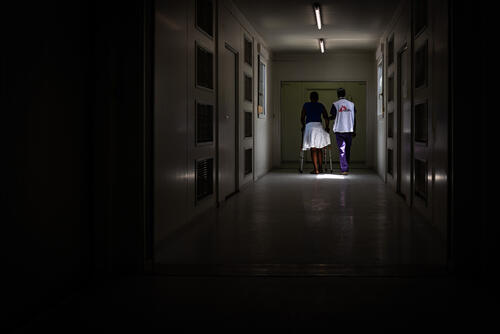
Armed clashes continue to affect communities in Haiti’s capital, Port-au-Prince. While maintaining functioning medical structures during these clashes is a challenge, with kidnappings and armed robberies rampant across Port-au-Prince, we have continued to provide trauma care. Our teams treat people with gunshot and stab wounds, severe burns, and victims of road accidents in several medical facilities across the capital.

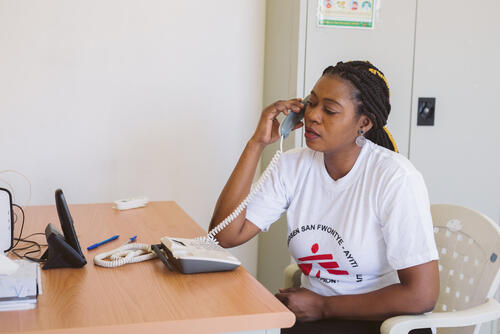
The prevalence of sexual and gender-based violence (SGBV) is a continuing concern in Haiti. We support multiple health facilities in providing care dedicated to victims of SGBV that includes medical, psychological, and social care. The introduction of a free telephone helpline has increased accessto care, offering victims remote psychological support and referrals to health centres.

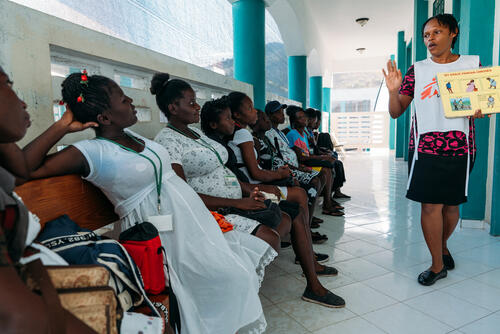
Sexual and reproductive care remains an essential area of activity for our teams in Haiti. We are providing women with proper prenatal and neonatal care to continue our work on reducing the maternal and infant mortality rate. We also provide recreational and educational activities to promote family planning and sexually transmitted disease prevention and management.

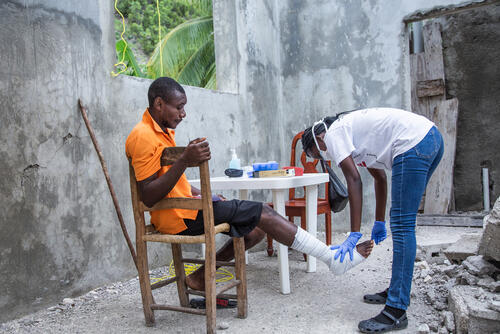
With enduring armed clashes and frequent natural disasters, our teams conduct emergency operations in Haiti. Water and sanitation support is provided to communities affected by the violence in Port-au-Prince. After an earthquake in August 2021, we provided emergency care to victims that included surgery, water and sanitation support and mobile clinics to rural areas.
Our activities in 2023 in Haiti
Data and information from the International Activity Report 2023.
1,968
1,968
€49.6 M
49.6M
1991
1991
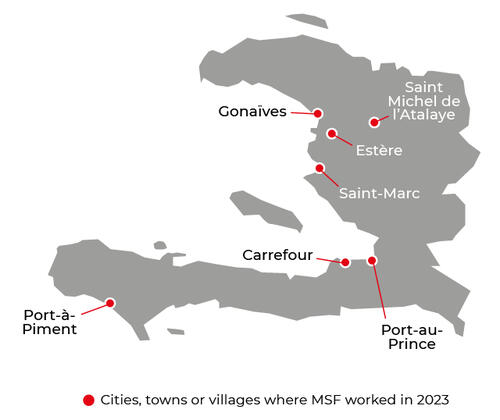

37,600
37,6
4,200
4,2
5,780
5,78

1,420
1,42
Image use and consent policy
Visual storytelling lies at the heart of Médecins Sans Frontières’ (MSF’s) social mission. Our images are crucial in allowing us to bear witness to crises, inform the public, inspire action, and raise the funds that allow us to continue our lifesaving activities.
The power of an image lies in its ability to tell a story, but this cannot come at the expense of the dignity, privacy, or agency of the people depicted. In telling the stories of our staff and the people we assist, we need to do so with great responsibility – both to those being photographed and filmed, and to our audience.
Every image must reflect the core values of MSF: humanity, respect, and integrity. By holding ourselves accountable to these standards, the stories we tell will then amplify voices, rather than silence them, and build understanding, rather than perpetuate stereotypes.
Bearing witness
Together with our medical action, we speak out about the underlying causes of people’s suffering and advocate change. This speaking out is often referred to in MSF as témoignage, which in French means ‘to bear witness.’ For us, this means a willingness to speak out about what we see, to share what our staff and the people we assist tell us.
Visual content plays a crucial role in our mission of bearing witness. It provides a powerful medium that draws attention to humanitarian crises, such as conflicts, disease outbreaks, natural and human-made disasters, and exclusion from health care.
We share the stories of people we work with and assist through written testimonies, photography, videography, audio, and other documenting mediums.
Portraying medical action with dignity
Gathering images in health facilities is sensitive, as it directly touches on the dignity, privacy, and vulnerability of patients. In these environments, people are often in distress, undergoing treatment, or facing serious health challenges.
Patients in hospitals are entitled to an environment where they feel safe, respected, and protected from overexposure. In medical settings, we approach photography and videography with extreme care and ensure that it is only done with the patient’s full understanding and voluntary consent.
MSF’s commitment to dignity and respect is a shared core principle in our Visual Storytelling Guidelines and in the Patient Charter. This means patients are not only respected during their treatment, but also in how they are represented in public communications. They must be portrayed in a way that respects their agency, honours their humanity, avoids perpetuating stereotypes, and does not exploit their suffering.
In practice, in our visual storytelling, we focus on the process of alleviating suffering and providing medical care, not solely on suffering.
How do we manage consent and image use?
- Respect and dignity: MSF is driven by the principles of medical ethics and prioritises patients’ well-being, dignity, and privacy at every step.
- Having a clear purpose: communication is only pursued when there is something meaningful to convey, whether it’s to present a specific point of view or share an important message.
- Context and accuracy: storytelling should be accurate and specific, reflecting the context in which we are working and avoiding oversimplified representations
- Safeguarding and do no harm: we prioritise people’s right to be protected from risk, harm, and stigmatisation above all else.
- Informed consent: people have agency and control over how they are represented; they are listened to and make free and informed decisions.
- Quality, not quantity: we take the time to build trust with people and communities while carefully gathering visual content
- Accountability: We are accountable to people and communities and to each other. We take responsibility when misrepresentation or misuse occurs.
- Challenge stereotypes and power dynamics: we strive not to replicate representations of saviourism, sensationalism, victimhood, and colonialism.
We believe taking photos of someone is not an extractive process, but a collaborative one.
Before taking an image, the photographer or a communications professional will take time to explain to people why we wish to photograph them, why it is important as part of MSF’s work, and how the images could be used. As a critical part of that conversation, it is also explained that their decision does not in any way affect the care and medical support they may receive from us.
If they accept, they will either sign a consent form or be filmed or recorded giving their consent. The quality of the conversations is what makes the difference in obtaining informed consent; a written consent form and a signature alone do not indicate a meaningful consent process.
The safeguarding of people being photographed always comes first, before any considerations for communications or fundraising. MSF has a responsibility to protect people from any harm in the context of participating in content gathering. What does ‘do no harm’ mean?
- Gathering content should not pose a physical nor psychological risk to the contributor.
- Content gathering should not pose a risk of stigmatisation, discrimination, nor stereotyping.
Sometimes, concealing the identity of individuals may be necessary to mitigate the risks of negative consequences, such as social reprisals, violence, or stigmatisation.
For groups at heightened risk, such as unaccompanied minors and victims/survivors of sexual or gender-based violence who are minors, we preserve their full anonymity.
A person has the right to withdraw their consent for use of their image.
When consent is given in writing, individuals are provided with a slip of paper reminding them of their option to withdraw consent, along with contact details for the local MSF office and the person to reach if they wish to do so.
Anyone wishing to remove their consent can send their request to [email protected], or use the process described on the copy of the consent form. The material will be removed from MSF’s media database and all attempts to track and erase previous uses will be made.
All MSF photos, including archival images dating back to the inception of MSF, are stored in our own media database. This allows all MSF staff to search through content to find what they need. This tool also allows us to regulate who can see and download images, but also how the content is being used.
We consider that content older than five years has expired consent. It is then subsequently restricted for internal use only and not readily accessible for most staff; it must be requested if needed.
The media database is available to all MSF staff, but also, with restrictions, to other people from relevant professional backgrounds or needs. This can include external contractors, staff from other nongovernmental organisations, media, and academics. These non-MSF users only have access to recent and pre-approved content.
All MSF pictures and videos on our internal media database are tagged with specific usage rights ranging from MSF use only to external media.
MSF does not sell, make money or profit from any picture taken either by MSF staff, hired photographers, or agency photographers documenting our projects. This includes prints or digital files online. MSF does not sell images as art prints or as a stock photo agency.
At MSF, collaborating with external media, photographers, and filmmakers has always played a vital role in helping us tell important stories, include diverse perspectives, and maximise visibility on critical issues.
Who are third parties?
In this context, third parties refer to individuals or organisations that are not directly employed by MSF but are either commissioned by MSF, or are granted access to our hospitals or activities, to document our work. This can include media outlets, agency photographers, and independent filmmakers.
Establishing a relationship of trust with these collaborators is key. When we facilitate their visit, we ensure they are fully briefed on our ethical standards and policies before they begin their work.
Examples of third-party collaborations:
Contracted commissions
When MSF directly commissions an external producer (e.g., a photographer or filmmaker), they sign a contract with MSF and are required to follow our Visual Storytelling Guidelines and Code of Conduct. Depending on the copyright agreement, we often retain more control over the content they create and can review their work to ensure it aligns with our ethical guidelines before it is published or distributed.
Access to MSF-run or supported hospitals and activities
Sometimes, third parties are granted access to document our work in hospitals or activities run or supported by MSF. In these cases, we have less control over how the content is used and shared. Additionally, access to facilities supported by MSF may sometimes be granted by local authorities, such as the Ministry of Health, rather than by MSF itself.
Media visits
For media visits, we follow a specific process outlined in our Media Visit Charter, which sets out our key ethical guidelines. Journalists are briefed on this before they visit our projects. However, once the visit is complete, we do not have direct control over the content they choose to publish or how they use the material they gathered during the visit.
Ultimately, by working closely with trusted collaborators and maintaining strong ethical standards, the stories we share uphold the dignity of those we serve and bring important humanitarian issues to the forefront of global conversations.
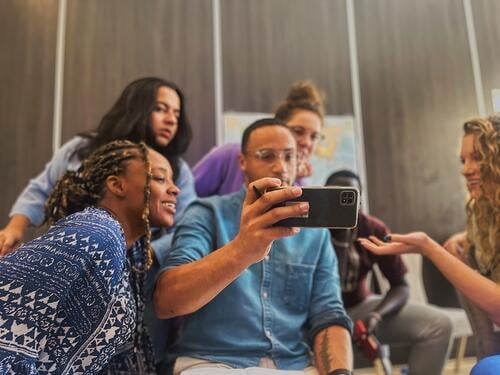
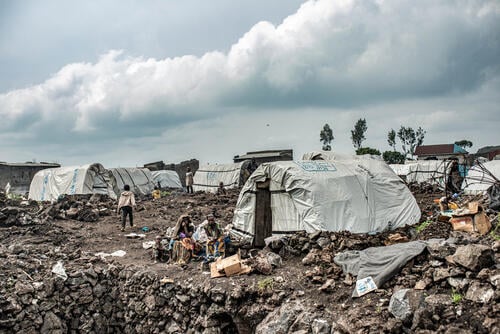
Assistance needed for people leaving and staying in Goma following weeks of violence

التغيرات التشريعية في بولندا تنتهك حق الناس في طلب اللجوء
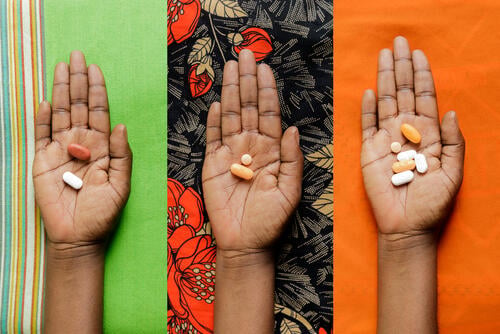
Uncertainty around PEPFAR programme puts millions of people at risk
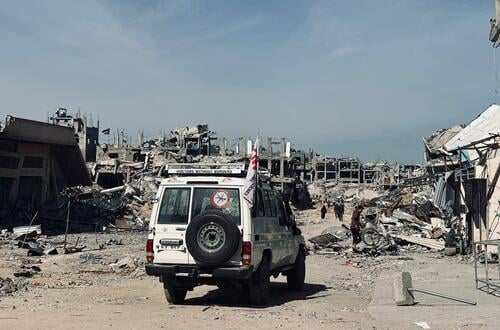
أربعة أسئلة حول شمال غزة
